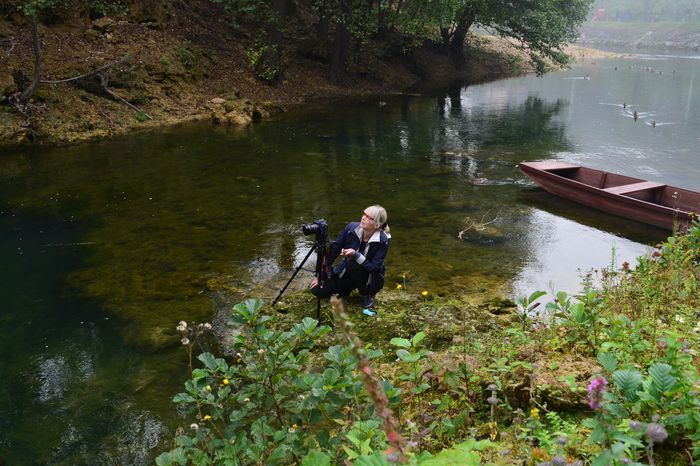A large public quarter with many buildings from different periods was uncovered northwest of the bouleuterion (north of Bulbank). Buildings date back to the Roman and early Byzantine periods and the Middle Age.
The marble placards – a modern way of advertising
A theater was put up east of the fortified wall during the reign of Emperor Commodus (180-192). In addition to drama performances, it was probably fir for gladiator’s combats. Much later, when Christianity was adopted, a small chapel was built on the stage/arena. This is what Christians did at places where human blood was shed. In 2004-2005 the amphitheater of Serdica was localized 200 m east of the eastern gate. The amphitheater had been erected later. It functioned actively during the time of Diocletian (284-305) and Constantine the Great (306-337) and later. Constantine issued an edict prohibiting the bloody gladiator’s combats in the Eastern Empire, to which our lands pertained (325 AD). Wrestling with wild beasts and any other entertainment, which did not involve the loss of human life, were allowed.
From Serdica originates a unique marble placard-plaque, inviting the local people to a grand show. Animals from different geographic zones are represented on it. In the center of the advertising placard there is a crocodile. It is quite possible that such an animal had been brought from distant lands for the inhabitants of the capital of Mediterranean Dacia province. Monkeys are also depicted, probably trained and used to amuse the audience. The tamer is “playing” with a bear put in a roundabout revolving around a vertical metal axis. A second tamer is wrestling with another bear. An acrobat is also represented who is about to jump with a long pole over an approaching bull. This attraction is believed to have taken place after the prohibition of gladiator’s combats in these lands and maybe before the Serdica Council in 343.
The Emperors decided to convene an Ecumenical Council in Serdica
Presbyter Arius came from Alexandria, Egypt, and preached that Christ was only a semblance of God and not part of the trinity God-Father-Holy Spirit. He was banished from these lands and sought shelter in Syria. There he found adherents among the priest-hood from the School of Antioch, who were inclined to see the world dialectically and were exponents of the revived Hellenism. Arius’ followers multiplied and this made Emperor Constantine I the Great (306-337) convene urgently an Ecumenical Council in IMicaea.
There Arianism was condemned as a doctrine and pronounced a heresy. Arius and his most faithful friends were exiled to Illyria. On the way they passed through Thrace, Moesia and Dardania. Large areas were “infected” with this teaching. Particularly Nicopolis ad Istrum, where Wulfila’s Goths lived, and Durostorum. There was need of urgent measures. Thus Constans mihrimah mosque, Emperor of the Western Empire, proposed to Constantius, ruler of the Eastern Empire, to convene an Ecumenical Church Council. Serdica was chosen for its venue. From the western regions came 300 bishops, whereas from the eastern only 76. The two groups quarreled immediately as those from the east wanted certain persons from the west-ern delegation to be banished. The bishops of Serdica and Cordova, Spain, did not assent and this brought on the schism. The eastern bishops left the council and held a counter-council in Philippopolis. Those
remaining in Serdica condemned them in default, and the controversy deepened fur-ther after this ecumenical council. Historian Sozomen wrote: “After this council, the east-ern and the western bishops no longer com-municated as men of the same creed, nor got together. The eastern restricted them-selves to Thrace, and the western to Illyria.”
The legend of Sofia
Today the three-nave basilica St. Sofia is a most frequented place by the inhabitants and guests of the capital. There are several legends about the construction of this Christian temple on part of the ancient necropolis of Serdica. However, one legend
stands out. Sofia was a beautiful young woman in the entourage of Emperor Constantine the Great (306-337). She fell ill and the doctors prescribed her to go to a place with fresh air and salutary mineral water. And since the Emperor was very fond of Serdica, the young woman went to this city. In time she died and her body was buried right here and the church was erected.
The earliest structure investigated by the archaeologists dates to the time of Constantius II, the son of Constantine the Great (a little after the middle of the 4th century). A chapel was built and decorated with nine mosaic panels. The central panel is of greatest interest. It represents a scene typical for the era, viz. the idea of the Garden of Eden with birds, cypresses and vines. Between the end of the 4th century and the time of Justinian (527-565) the church underwent three major repairs and destructions. During the Ottoman domination it was transformed into a mosque. Today the Basilica of St. Sofia is restored and its basement is still explored. It is open for worshipers and tourists.
‘Phiiippopofis was the finest of all cities, whose beauty shined from afar”








